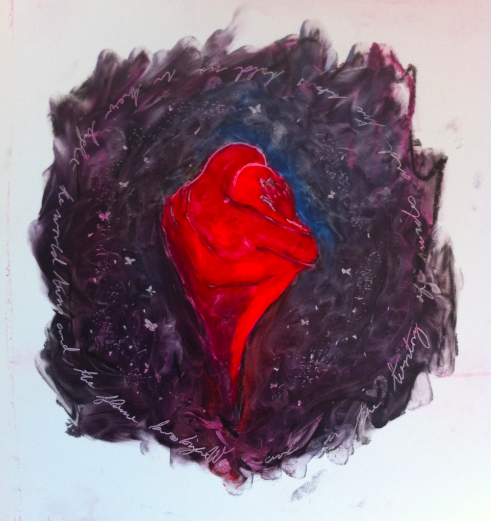“Our love was like our house. There were cracks in the walls and chips in the paint, but it kept us safe, warm and dry.” His eyes were hollow. His wife, the love of his life, died two weeks ago after a stroke. I was there to give him the painting inspired by one of his tweets. “We are in the territory of miracles,” he had written, and so I painted this:

Later, he asked for it and still later, he gave me the news that it was over. I had the painting mounted and we met for lunch so that I could give it to him. It was the first time we had met in person, despite feeling as though we knew each other.
We talked about typical Joburg things. Work, clients, possessions, the way we define ourselves. He has a successful business, but he only buys what he needs, he said. To be kind and generous and good is as hard as being successful, he told me. That is what he aims for.
I told him that I had a sense of what he meant. How, at the beginning of this month, I had something of an epiphany. (Yes, I know, again. I’ve had an epiphany a month for the past four years.) I was going to rate my life, not be whether I was successful, or productive, or whether I’d made money that day. I was going to assess each day by how meaningful it was. After all, if you can make meaning, that is all that matters.
And that’s how I came to let go of something I used to imagine was the defining aspect of my identity: my ambition. For the first time since I was five years old, I am not holding out for some imagined future achievement. I’m not holding out for anything,
Because what is the point? We spend so much energy trying too hard to accumulate things — accolades, possessions, achievements — because we are supposed to and surrounding ourselves with all of this will make us feel better about ourselves.
It won’t.
This means giving up the middle-class dream, which can be summarised, roughly, as: money, house, SUV, husband, holidays, kids in private school. That’s what most people in my social class aspire to, and by their late 30s, they’ve more or less achieved it.
It is a dream I grew up with, a dream that is thoroughly inculcated into my cultural milieu. The only people of my class, education and upbringing who do not achieve it are drug addicts.
(I’m tempted to invent a drug habit, if only because it will make the narrative tidier.)
I sat there, eating my salad, reflecting on the difference between the man I had imagined through my dealings with him on Twitter, and the man sitting across the table from me.
There was a time when a conversation like this, about loss and pain and anguish, would have been really hard. I would have avoided it. But my mother-in-law died in front of me five and a half years ago, and I had to hold my husband through his grief before we took her out of her housework clothes and dressed her in a nice suit for the post-mortem. When you touch a dead body, when you bend limbs that can no longer move of their own accord, it changes everything.
So I know about death. I know about how, months later, the world moves on and expects you to do the same. I know how the pain and the loss never goes away, or the guilt because you don’t feel enough. How it hollows you out like termites.
This is the thing about adversity: it strips you to your essence. You come out of the other side, but nothing matters quite the same as it did.
In the end, this is all we really need. To be safe, and warm, and dry.


